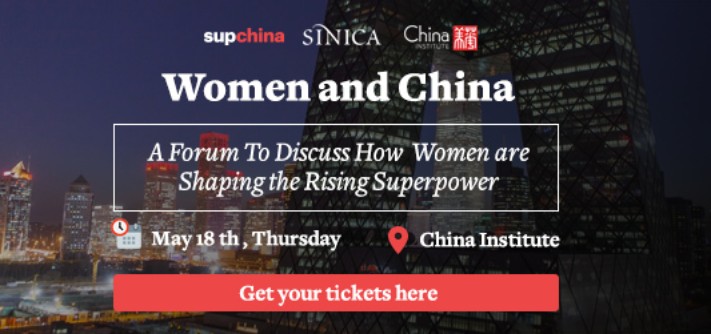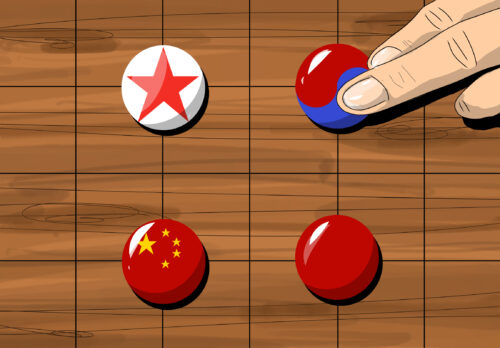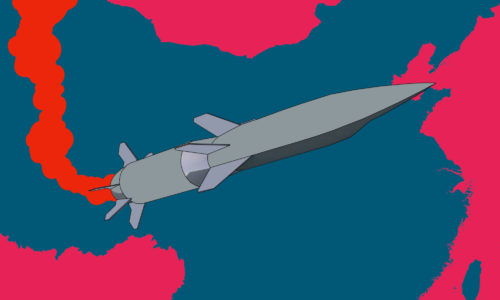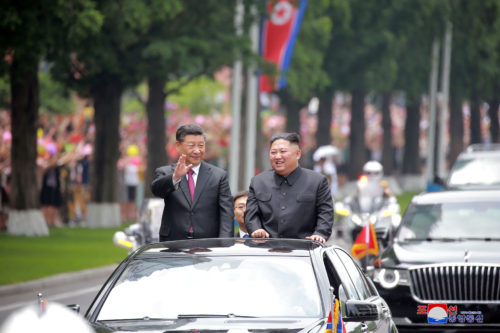‘Swords drawn’ over North Korea
Top China news for April 17, 2017. Get this daily digest delivered to your inbox by signing up at supchina.com/subscribe.

North Korea: Military parade and failed missile test
Tensions remain high in northeastern Asia. Xinhua News Agency says (in Chinese) that “swords are drawn and bows bent” in the Korean Peninsula, using a metaphor for a state of hostility. ABC reports that “North Korea rolled out ballistic missiles and other weaponry at a huge parade Saturday and later in the day, at 5:21 p.m. ET, made a failed attempt to shoot off a missile, which exploded immediately after launch.” CNN has an explainer with photographs of the military hardware on display at the parade.
The New York Times calls (paywall) the failure of the missile test “a deep embarrassment for the North’s leader, Kim Jong-un, because the missile appeared to have been launched to show off his daring as a fleet of American warships approached his country.” Lt. Gen. H. R. McMaster, Donald Trump’s national security adviser, told ABC that “it’s clear that the president is determined not to allow this kind of capability to threaten the United States.”
LA Times reporter Jon Kaiman was held up at Pyongyang’s airport for unknown reasons after he covered the parade of missiles in the North Korean capital; you can hear an NPR interview with him as he waited for a flight here. Here are some other relevant links:
- New York Times: North Korea may be preparing its 6th nuclear test (paywall)
- Washington Post: China’s Korea policy ‘in tatters’ as both North and South defy sanctions
- Bloomberg: North Korea said to snub Chinese diplomats as tensions mounted
Investigating an anti-corruption investigator
The top anti-graft watchdog Central Commission for Discipline Inspection (CCDI) has announced (in Chinese) an investigation for disciplinary violation into one of its own former senior inspectors: Zhang Huawei 张化为. Reuters comments that “the move could also be used as a way for Xi to justify retaining top graftbuster Wang Qishan in a central leadership position beyond the usual retirement age at an upcoming leadership reshuffle late this year.” In related news, the People’s Daily has issued a brief statement (in Chinese) confirming that Xiang Junbo 项俊波, the former PLA soldier and television writer, has been removed from his official role as head of the China Insurance Regulatory Commission as he faces an anti-corruption investigation that was announced last week.
Women and China:
A Forum on How Women Are Shaping the Rising Global Power
The China Project’s conference in New York on May 18 will feature 20 women leaders in Chinese technology, business, and culture. Read all about it and buy your early-bird tickets up until April 18.
Official GDP numbers released: Fastest growth in six quarters
A spokesperson for China’s National Bureau of Statistics (NBS) announced (in Chinese) the report on the country’s economic performance in the first quarter of 2017 at a press conference on April 17. Xinhua says the report shows “better-than-expected growth,” as gross domestic product (GDP) rose 6.9 percent year on year to hit 18.07 trillion yuan ($2.63 trillion) from January to the end of March, which Reuters reports was “the fastest in six quarters, with forecast-beating March investment, retail sales and exports all suggesting the economy may carry solid momentum into spring.”
But the news has not diminished some worries about the future of China’s economy. Reuters cites concerns that “Beijing is still relying too heavily on stimulus and ‘old economy’ growth drivers, primarily the steel industry and a property market that is overheating,” while Xinhua quotes an analyst at the bank J.P. Morgan, who says, “It is fair to say the housing market …is a major uncertainty for the economic outlook this year.”
Video of China-built port and school at Gwadar in Pakistan
The People’s Daily has published a propaganda video (in Chinese) showing the construction of the Gwadar port and free trade area, one of the most prominent projects in China’s One Belt, One Road plan and a key part of the China-Pakistan Economic Corridor. The video includes footage of a school funded by China. Another piece of One Belt, One Road video propaganda is this footage shot by a drone, which Xinhua News Agency tweeted with the comment “From poverty to prosperity. China-Laos border port witnesses changes thanks to #BeltandRoad.”
—Jeremy Goldkorn, Editor-in-Chief
This issue of the The China Project newsletter was produced by Sky Canaves, Lucas Niewenhuis, Jia Guo, and Jiayun Feng. More China stories worth your time are curated below, with the most important ones at the top of each section.
BUSINESS AND TECHNOLOGY:
Anbang abandons deal in the U.S., but Ant Financial pushes ahead
Anbang Insurance Group, one of the highest-profile Chinese companies proposing acquisition deals in the U.S., will abandon its $1.6 billion offer for U.S. annuities and life insurer Fidelity & Guaranty Life, sources told Reuters on April 16. Though Anbang had received clearance for the deal from the Committee on Foreign Investment in the United States (CFIUS), it “could not get past some U.S. state regulators,” the sources said. This marks the second large deal that Anbang has forgone in the United States in a little over a year, after its deal to buy Starwood Hotels & Resorts Worldwide, Inc. for $14 billion fell through 13 months ago. Just last month, discussions were also called off between Anbang and the family of Jared Kushner, Donald Trump’s son-in-law, over a potential $4 billion real estate deal in New York.
Meanwhile, Ant Financial, an affiliate of ecommerce giant Alibaba, pushed ahead with a deal in the U.S. as it raised the stakes to acquire wire transfer service MoneyGram by more than a third to $1.2 billion. MoneyGram won’t officially vote on the deal for another month, and approval by CFIUS is always a challenge for Chinese firms, though analysts indicate that the new deal is promising and that Ant Financial has likely beat out its Kansas-based rival bidder, Euronet Worldwide, Inc.
- India’s phonemakers cry foul on Chinese rivals / Financial Times (paywall)
“Over the past year, Chinese smartphone makers such as Xiaomi, Lenovo and Oppo have launched an intense assault on India, where their market share grew to 46 percent in the final quarter of 2016 from 14 percent a year earlier, according to Counterpoint Research. Indian brands’ share fell from 54 percent to 20 percent during the same period.” - China’s new air purifier standards set to filter low-quality products / TechNode
TechNode cites reports (in Chinese) that two new regulations of the booming air purifier market, one concerning standards for air filters and the other concerning standards for dust collection (《空气净化器用滤网过滤器》and《空气净化器用静电式集尘过滤器》), are in their “final stage” of preparation and will be rolled out in 2018. - Shield tunneling for underground parking starts in Zhengzhou / China Daily
“It is the first time the protective drilling method has been used in China’s busy downtowns to solve parking difficulties.” - Asia stocks fall on China regulatory crackdown, North Korea tensions / MarketWatch
- How a Chinese investment boom is changing the face of Djibouti / SCMP
- Xinjiang to invest 14.4 billion yuan on airport construction / China Daily
POLITICS AND CURRENT AFFAIRS:
Fugitive billionaire’s corruption claim of questionable significance
The New York Times has investigated (paywall) claims made by Miles Kwok — aka Guo Wengui 郭文贵, the billionaire fugitive from China currently living in the U.S. — that high-level corruption in China extends to the very top of the last Politburo Standing Committee, but was unable to confirm Guo’s claims, which were provided without evidence. See Times reporter Mike Forsythe’s description of how he looked into Guo’s accusations here on Twitter. Guo disappeared from public view in 2015 after a series of business disputes, only to emerge earlier this year in a three-hour-long interview with U.S.-based Chinese media site Mingjing. In the interview, he alleged that He Jintao 贺锦涛, the son of He Guoqiang 贺国强, who led China’s anti-corruption operations from 2007 to 2012, had abused his position of power in a business dealing with Guo, but gave no specifics.
The Chinese political observation blog Politics from the Provinces had a well-laid-out and cynical response to the accusations. It says, in part, “If He ends up under investigation, would his takedown mean anything in present Chinese politics? … Chinese officials already know that the anti-corruption campaign is real and that it’s been targeting every level of officialdom. Local officials in particular spend almost as much time looking over their shoulders for inspection teams as they do trying to make policy.” It is no secret, the blog argues, that elite politicians have used their power for personal benefit in China, and furthermore, it has already been shown that the anti-corruption drive is more than just politically motivated: “Every official is vulnerable,” including those in the He family.
- Details emerge of ‘terrorism suspect’ arrest during armed raid in China / SCMP
A man has been held since 2014 after paramilitary police operations on Hainan Island, but little information is given in state media about his identity or alleged crimes. He is said to have had “more than 100 people under his command” in Turkey. His case was mentioned in a state media segment about counterterrorism operations that aired on April 16. You can watch the segment here (in Chinese); the relevant footage starts at the time stamp 06:55. - Cash rewards help put dent in terrorism / China Daily
Eighteen people from Hotan County in the Xinjiang Uyghur Autonomous Region have shared 1.1 million yuan ($159,700) in rewards for their contributions to maintaining social stability — including fighting terrorism — according to a news report in the Xinjiang Daily over the weekend. - Naval forces save commercial ship from pirate attack – a Panamanian ship in the Gulf of Aden, between Somalia and Yemen / China Daily
- 13 killed, 6 injured in SW China bus accident – in Guizhou Province / Xinhua
- 8 missing in NW China landslide – in Shaanxi Province / Xinhua
- Reports: Tibetan self-immolates in western China / SCMP
- Chinese top political advisor meets Vietnamese deputy prime minister / China Daily
- Graft suspect on run in Canada ‘persuaded to return’: China / Globe and Mail
SOCIETY AND CULTURE:
Anti-gay banner at Wuhan university
On April 16, a photo of two women holding up a blatant anti-gay banner appeared on social media accounts (in Chinese) of students at Huazhong University of Science and Technology in Wuhan, in the central Chinese province of Hubei. The banner reads, “Maintain the traditional values of the Chinese nation, defend the core values of socialism, resist the corruption of decadent Western ideas, keep homosexuality far away from the university campus.” The photos have sparked an escalating backlash from China’s LGBTQ community and the general public. On the social media platform Weibo, one internet user wrote (in Chinese), “Why would someone who has received a college education say ignorant things like this?”
Toilet paper thieves strike Chengdu park
In March, reports emerged of facial recognition being tested in the public toilets of a Beijing park to deter the elderly thieves who were taking away large quantities of toilet paper. On April 16, Chengdu Evening News reported (in Chinese) that a “toilet revolution” announced by the city on April 1, which was intended to ensure that public toilets at a city park are equipped with hand sanitizer and ample toilet paper, has fallen victim to thieves, who removed 1,500 rolls of toilet paper in just seven days. Many of the comments (in Chinese) about the news on the social media platform Weibo repeat a common Chinese complaint about the low “quality” (素质 sùzhì) of the citizenry.
- Director of China’s ‘Journey to the West,’ Yang Jie, dies aged 88 / SCMP
“In China’s 30 years of TV production, few…match the influence of Yang’s adaptation of the 16th-century novel.” - The silent majority and the great majority / China Heritage
“Here we remember and commemorate the work of Wang Xiaobo 王小波, a writer of prose and fiction who died twenty years ago. In a celebrated essay titled ‘The Silent Majority’ 沉默的大多数 (chénmò de dà duōshù), Wang wrote about what he called the yin and yang of public expression in China, or the World of Silence and the World of Speech.” - China box office: ‘Furious 8’ paves new roads / China Film Insider
- Shanghai sizzles in 120-year high heat / China Daily
- LOOK: 88-meter-tall Goddess of Beauty statue being built in Guizhou / Shanghaiist
- Hong Kong hikers warned as death toll exceeds 2016 total in just four months / SCMP
- VistaJet now lets clients book private jets on WeChat / Jing Daily
- Nine Chinese photographers you need to follow / TIME
- Over 900,000 foreigners work in Chinese mainland in 2016 / China Daily







